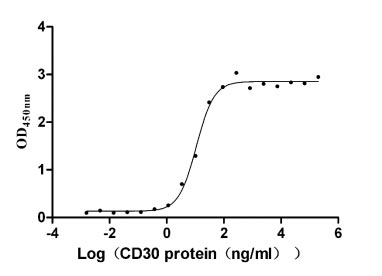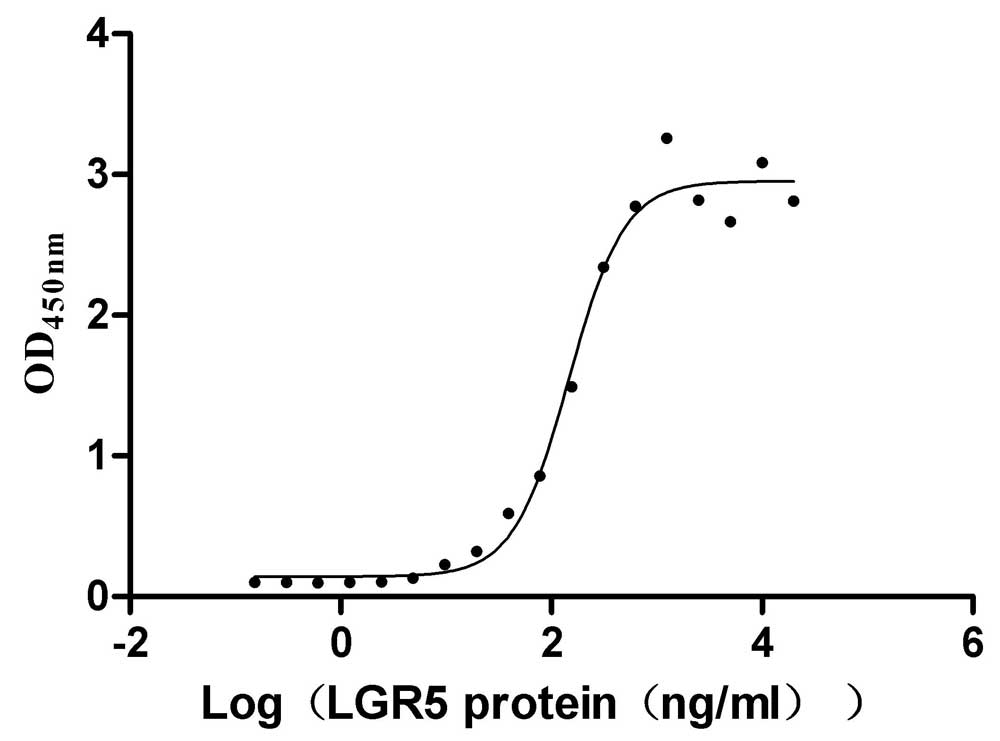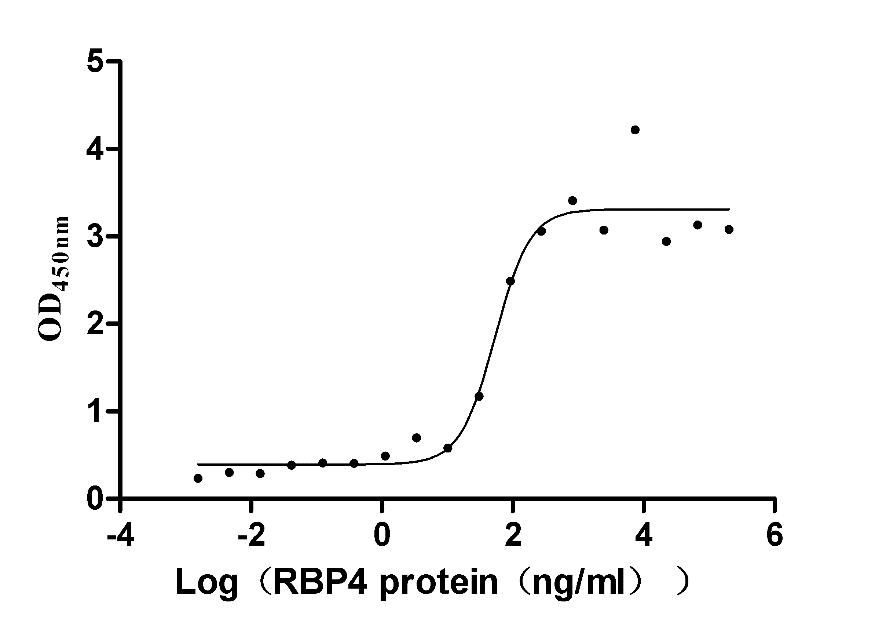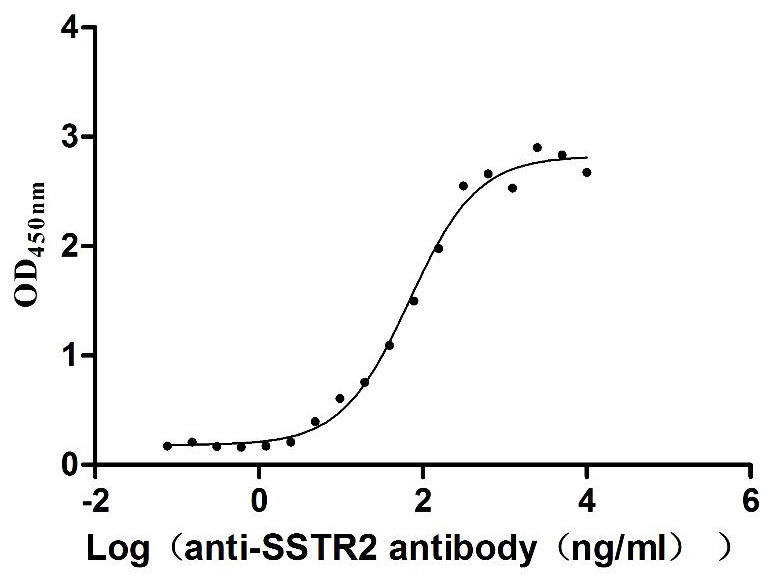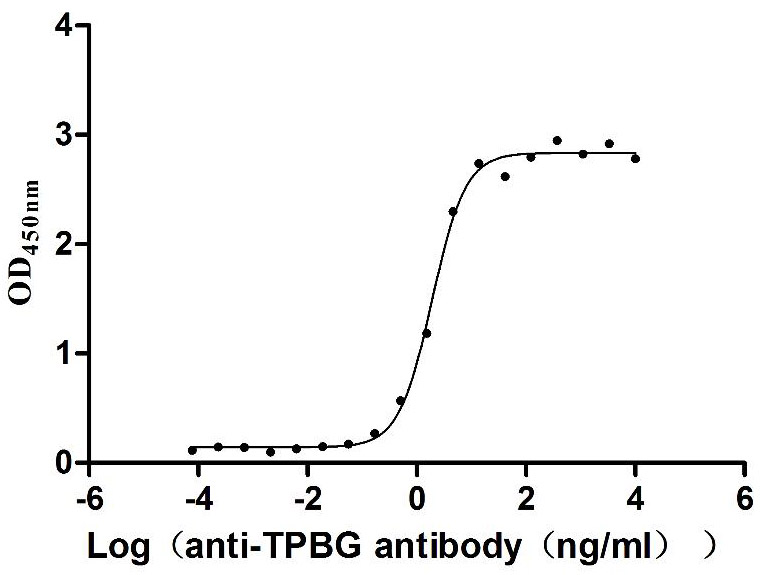Recombinant Human Hyaluronidase-1 (HYAL1)
-
中文名称:人HYAL1重组蛋白
-
货号:CSB-BP623651HU
-
规格:
-
来源:Baculovirus
-
其他:
-
中文名称:人HYAL1重组蛋白
-
货号:CSB-EP623651HU-B
-
规格:
-
来源:E.coli
-
共轭:Avi-tag Biotinylated
E. coli biotin ligase (BirA) is highly specific in covalently attaching biotin to the 15 amino acid AviTag peptide. This recombinant protein was biotinylated in vivo by AviTag-BirA technology, which method is BriA catalyzes amide linkage between the biotin and the specific lysine of the AviTag.
-
其他:
-
中文名称:人HYAL1重组蛋白
-
货号:CSB-MP623651HU
-
规格:
-
来源:Mammalian cell
-
其他:
产品详情
-
纯度:Greater than 85% as determined by SDS-PAGE.
-
基因名:HYAL1
-
Uniprot No.:
-
别名:HYAL 1; Hyal-1; HYAL1; HYAL1_HUMAN; Hyaluronidase 1; Hyaluronidase-1; Hyaluronoglucosaminidase 1; Hyaluronoglucosaminidase-1; Hyaluronoglucosaminidase1; LUCA 1; LUCA-1; LUCA1; Lung carcinoma protein 1; MGC45987; NAT6; Plasma hyaluronidase; Tumor suppressor LUCA 1
-
种属:Homo sapiens (Human)
-
蛋白长度:Full Length of Mature Protein
-
表达区域:22-435aa
-
氨基酸序列FRGPLLPNRPFTTVWNANTQWCLERHGVDVDVSVFDVVANPGQTFRGPDMTIFYSSQLGTYPYYTPTGEPVFGGLPQNASLIAHLARTFQDILAAIPAPDFSGLAVIDWEAWRPRWAFNWDTKDIYRQRSRALVQAQHPDWPAPQVEAVAQDQFQGAARAWMAGTLQLGRALRPRGLWGFYGFPDCYNYDFLSPNYTGQCPSGIRAQNDQLGWLWGQSRALYPSIYMPAVLEGTGKSQMYVQHRVAEAFRVAVAAGDPNLPVLPYVQIFYDTTNHFLPLDELEHSLGESAAQGAAGVVLWVSWENTRTKESCQAIKEYMDTTLGPFILNVTSGALLCSQALCSGHGRCVRRTSHPKALLLLNPASFSIQLTPGGGPLSLRGALSLEDQAQMAVEFKCRCYPGWQAPWCERKSMW
-
蛋白标签:Tag type will be determined during the manufacturing process.
The tag type will be determined during production process. If you have specified tag type, please tell us and we will develop the specified tag preferentially. -
产品提供形式:Lyophilized powder
Note: We will preferentially ship the format that we have in stock, however, if you have any special requirement for the format, please remark your requirement when placing the order, we will prepare according to your demand. -
复溶:We recommend that this vial be briefly centrifuged prior to opening to bring the contents to the bottom. Please reconstitute protein in deionized sterile water to a concentration of 0.1-1.0 mg/mL.We recommend to add 5-50% of glycerol (final concentration) and aliquot for long-term storage at -20℃/-80℃. Our default final concentration of glycerol is 50%. Customers could use it as reference.
-
储存条件:Store at -20°C/-80°C upon receipt, aliquoting is necessary for mutiple use. Avoid repeated freeze-thaw cycles.
-
保质期:The shelf life is related to many factors, storage state, buffer ingredients, storage temperature and the stability of the protein itself.
Generally, the shelf life of liquid form is 6 months at -20°C/-80°C. The shelf life of lyophilized form is 12 months at -20°C/-80°C. -
货期:Delivery time may differ from different purchasing way or location, please kindly consult your local distributors for specific delivery time.Note: All of our proteins are default shipped with normal blue ice packs, if you request to ship with dry ice, please communicate with us in advance and extra fees will be charged.
-
注意事项:Repeated freezing and thawing is not recommended. Store working aliquots at 4°C for up to one week.
-
Datasheet :Please contact us to get it.
相关产品
靶点详情
-
功能:May have a role in promoting tumor progression. May block the TGFB1-enhanced cell growth.
-
基因功能参考文献:
- Data revealed a significant inverse correlation between ERalpha and HYAL1 gene expression in human breast tumors. HYAL1 was found repressed by estrogen through ERalpha binding to a consensus response element (ERE) located in the proximal promoter of HYAL1 and flanked by an Sp1 binding site, required to achieve optimal estrogen repression. PMID: 27764788
- Ureaplasma urealyticum infection may affect the activity of hyaluronidase on spermatozoa PMID: 28012250
- our results suggest that the enzyme HYAL1 plays a role in tumor dissemination and brain-specific colonization, rather than in subsequent metastatic out-growth. PMID: 28168629
- HAS2 and HAS3 were the only hyaluronan synthases detected, the expression of which was almost similar in NPs and NM. PMID: 26661071
- Molecular docking simulation explains the less favorable binding energy of substrate towards mutant E268K, thereby providing a structural basis for its reduced catalytic activity. PMID: 27424109
- The receiver-operating characteristic curve analyses demonstrated that each one had good sensitivity and specificity for distinguishing BC patients from non-BC ones (HYAL1, miR-210, miR-96, lncRNA-UCA1, 91.5 and ). PMID: 26138586
- Study showed that reduced HYAL1 expression was associated with endometrial carcinoma aggressiveness, which further supported the role of hyaluronan degradation in cancer progression. PMID: 25584766
- Results demonstrated that HYAL1 was C-mannosylated and suggest the possible role of C-mannosylation for secretion and enzymatic activity of HYAL1. PMID: 24820161
- In contrast to the previously described MPS IX patient, our three patients display a phenotype limited to the joints, suggesting that this is the primary manifestation of HYAL1 deficiency. PMID: 21559944
- Upregulation of HYAL1 expression in breast cancer promoted tumor cell proliferation, migration, invasion and angiogenesis. PMID: 21829529
- This is the first report showing high HYAL-1 levels in epithelial ovarian cancer. PMID: 21695196
- HYAL-1 and HAS1 expression predicted BCa metastasis, and HYAL-1 expression also predicted disease-specific survival. PMID: 20960509
- HYAL1 overexpression is correlated with the malignant behavior of breast cancer. PMID: 20473947
- Hyaluronan synthases (HAS1-3) and hyaluronidases (HYAL1-2) in the accumulation of hyaluronan in endometrioid endometrial carcinoma PMID: 20875124
- Overexpression of HYAL1 is associated with colorectal cancer. PMID: 20849597
- The protein products HABP2 and HYAL1 were associated with plasma PAI-1 concentration and play key roles in hyaluronan metabolism, providing genetic evidence to link these pathways. PMID: 20558613
- rhHyal-1 is endocytosed by the liver. PMID: 20572808
- HYAL-1 is a potential prognostic marker for predicting progression to muscle invasion and recurrence in bladder cancer. PMID: 19345473
- Data show that a significant in expression levels of HA synthases (HASs) and hyaluronidases (Hyals) was observed in vitro on stimulation of epithelial ovarian carcinoma cells by gonadotropins. PMID: 20072653
- Characterization of the murine hyaluronidase gene region reveals complex organization and cotranscription of Hyal1 with downstream genes, Fus2 and Hyal3. PMID: 11929860
- Alternative mRNA splicing controls cellular expression of enzymatically active hyaluronidase. PMID: 12084718
- Down-regulation of HYAL1 is associated with small cell lung cancer and glioma PMID: 12684632
- Increased expression of hyaluronidase is associated with head and neck tumors PMID: 12845686
- Hyaluronidase and CD44 hyaluronan receptor are expressed in squamous cell laryngeal carcinoma PMID: 16713680
- Gene silencing of HYAL1 inhibited cell proliferation and induced cell cycle arrest in human breast cancer cells. PMID: 16831275
- HYAL1-v1 transfectants grew 3- to 4-fold slower due to cell cycle arrest in the G(2)-M phase and increased apoptosis. PMID: 17145867
- Purified recombinant Hyal-1 from Drosophila cells was used for the investigation of the inhibitory activity of new ascorbic acid derivatives PMID: 17227790
- further support to altered glycosaminoglycan metabolism (hyaluronan and hyaluronidase blood levels)in type 1 diabetes as a potential mechanism involved in accelerated atherogenesis. PMID: 17415544
- hyaluronan processing by elevated HYAL1 expression in invasive prostate cancer is a requirement for progression. PMID: 17502371
- crystal structure reveals a molecule composed of two closely associated domains: a catalytic domain that adopts a distorted (beta/alpha)8 barrel resembling that of bee venom hyaluronidase, and a novel, EGF-like domain PMID: 17503783
- Hyaluronidase activity is modulated by complexing with various polyelectrolytes including hyaluronan PMID: 18083358
- The expression of HYAL1 in ductal hyperplastic tissues is a strong predictor of subsequent development of invasive breast cancer PMID: 18281563
- Bovine serum albumin competes with human hyalurinodase and thus increases hyaluronidase release resulting in a large increase in the hydrolysis rate. PMID: 18677769
- HYAL-1 expression is epigenetically regulated by the binding of different transcription factors to the methylated and unmethylated HYAL-1 promoter PMID: 18718911
- Down-regulation of RBSP3/CTDSPL, NPRL2/G21, RASSF1A, ITGA9, HYAL1 and HYAL2 genes in non-small cell lung cancer PMID: 19140316
- define key components of Hyal1 active site catalysis, and structural factors critical for stability PMID: 19201751
- HYAL1, but not HYAL2, expression is reduced and correlates with the accumulation of hyaluronan in ovarian carcinomas. PMID: 19435493
- Data showed that the HYAL1 variant exhibited hyaluronan degradation at elevated pH. PMID: 19478093
- Invasive features of ER(-) breast cancer cells can be characterized in vitro by higher secretion of hyaluronidase, higher expression of proteinases MMP-9, cath-D, and the angiogenesis promoting factor VEGF. PMID: 19567141
显示更多
收起更多
-
相关疾病:Mucopolysaccharidosis 9 (MPS9)
-
亚细胞定位:Secreted. Lysosome.
-
蛋白家族:Glycosyl hydrolase 56 family
-
组织特异性:Highly expressed in the liver, kidney and heart. Weakly expressed in lung, placenta and skeletal muscle. No expression detected in adult brain. Isoform 1 is expressed only in bladder and prostate cancer cells, G2/G3 bladder tumor tissues and lymph node sp
-
数据库链接:
HGNC: 5320
OMIM: 601492
KEGG: hsa:3373
STRING: 9606.ENSP00000266031
UniGene: Hs.75619
Most popular with customers
-
Recombinant Human Glypican-3 (GPC3) (G537R), partial (Active)
Express system: Mammalian cell
Species: Homo sapiens (Human)
-
Recombinant Human Tumor necrosis factor ligand superfamily member 8 (TNFSF8), partial (Active)
Express system: Mammalian cell
Species: Homo sapiens (Human)
-
Recombinant Human R-spondin-1 (RSPO1), partial (Active)
Express system: Mammalian cell
Species: Homo sapiens (Human)
-
Recombinant Mouse Retinol-binding protein 4 (Rbp4) (Active)
Express system: Mammalian cell
Species: Mus musculus (Mouse)
-
Recombinant Human Somatostatin receptor type 2 (SSTR2)-VLPs (Active)
Express system: Mammalian cell
Species: Homo sapiens (Human)
-
Express system: Mammalian cell
Species: Macaca fascicularis (Crab-eating macaque) (Cynomolgus monkey)
-
Recombinant Macaca fascicularis Trophoblast glycoprotein (TPBG), partial (Active)
Express system: Mammalian cell
Species: Macaca fascicularis (Crab-eating macaque) (Cynomolgus monkey)
-
Recombinant Human Desmoglein-3 (DSG3), partial (Active)
Express system: Baculovirus
Species: Homo sapiens (Human)


-AC1.jpg)
